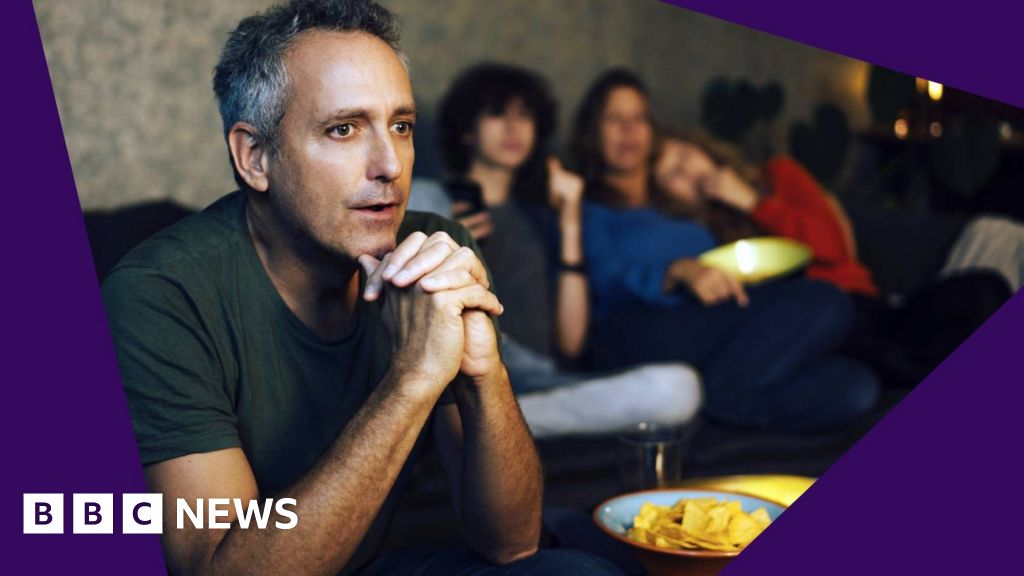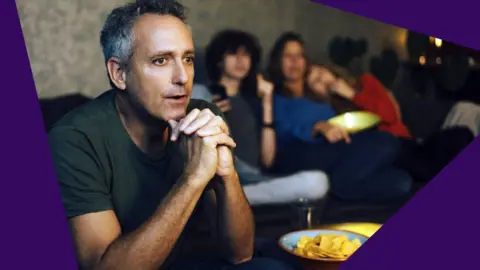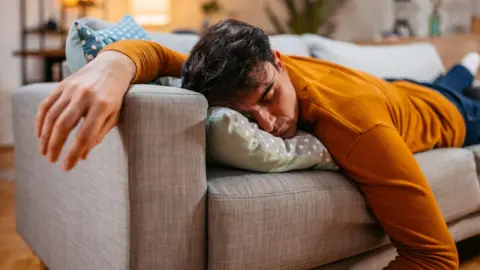
 Getty Images
Getty ImagesHello there election enthusiasts!
I love the idea of a full night of election drama – sitting up in front of the television, the BBC News live page updating on my laptop, slowly converting a mountain of snacks into a wasteland of empty wrappers and mainlining unseemly quantities of tea.
But we’re fighting biology here, fellow election-night crew.
So I’ve been chatting to sleep experts to come up with the definitive guide to getting through the night and not becoming a sleep-deprived monster the next day.
I’m going for the hardcore plan – we’ve got to be up all day Thursday whether that’s for work or childcare, then we’re watching the whole thing overnight and we’re back in the office on Friday.
There’s a milder plan too (that we’ll discuss at the end) but all the tips here will help you see democracy in action.
The four-nap plan
 Getty Images
Getty ImagesIn an ideal world you need to be well-rested before you even get to Thursday night.
There’s no such thing as “sleep banking” ahead of time but if you’re already wrecked then it’s going to be a struggle.
The core of our plan is going to involve a solid nap strategy.
Napping cannot replace the remarkable restorative power of a night’s sleep but it is scientifically proven to boost to alertness and concentration levels – essential for keeping up with the results.
“If you’re staying up all night, I’d have a pre-emptive nap before it starts and have another in the middle of the night,” says Dr Allie Hare, a sleep medicine consultant at the Royal Brompton Hospital in London.
Nap three is on Friday morning, pre-work or pre-school-run, to get us out of the door, and number four is in the middle of the day.
“There’s a natural lull after lunch so that’s a good time to do it,” says Dr Hare.
She thinks the “push through Friday” approach is best for most people in order to avoid completely disrupting their usual sleeping pattern.

Pro tip: Pre-loaded naps
Nap technique is a delicate art. You’re aiming for 20-30 minutes in order to get a restorative boost, but go any longer and you’ll mess yourself up.
“If you drop into a deeper sleep, coming out of that can leave you really groggy,” says Professor Russell Foster from the University of Oxford.
It’s called sleep inertia – that feeling when you wake up worse than when you nodded off.
Nap-pros have perfected the art of “pre-loading” and this comes expert-recommended.
The idea is if you have a coffee immediately before your 20-minute nap (set a timer on your phone) and then the caffeine hits its peak just as the nap ends, you’re perky and ready to go as soon as you wake up.
“It’s a good idea,” says Prof Foster.
So I’m thinking naps at 21:00 on Thursday, then 02:00, 06:00 and 14:00 on Friday – but make that pattern work for you.
You are still going to feel tired, so bright lights are your friends.
During the night, keep the lights on full-whack, and during the day, spend your time outside to trick your brain into thinking you’re supposed to be awake.
The caffeine plan
 Getty Images
Getty ImagesIf you want to stay wired throughout the night then the odds are you’re going to need a performance-enhancing drug – hello caffeine!
The drug is a stimulant so it makes you feel less tired and more alert.
But again, we need a plan and we don’t want too much.
Prof Foster argues for the judicious use of tea and coffee, but would “personally avoid” energy drinks as they are packed with sugar.
“You will crash afterwards and go in completely the opposite direction,” he says.
However, energy drinks do give you a bigger caffeine hit. You could hunt out a zero-sugar option, but don’t go overboard.
“Don’t overdose on the caffeine and have palpitations and anxiety,” says Dr Hare.
You’re also going to want to leave several hours for the caffeine to wear off so it doesn’t disrupt Friday night’s sleep. Put the kettle down by mid-afternoon on Friday.
Oh, and remember to keep yourself well-hydrated overnight in order to keep that brain ticking over. Not just coffee – water too.
And whether you’re celebrating, commiserating or just along for the ride, booze could be fun. It is not, however, an elite strategy.
“Do not have alcohol involved in any of this – I realise everyone will but the sleep advice is don’t, it’s just a sedative and it’ll make it harder,” says Dr Hare.
Manage your sugar levels
You’re going to have to accept that disrupting your sleep is going to have a knock-on effect on your hunger hormones.
Your brain will sense levels of the hormone leptin dropping and ghrelin shooting up, and the combined effect is that you will feel the urge to binge.
“You will have cravings and be tempted to send out for pizza and grab the Twixes,” says Prof Foster. “So beware, you’ll be more hungry.”
You can’t really dodge this but you can plan for it, surrounding yourself with food focused on protein and slow-release carbohydrates.
Prof Foster suggests protein drinks or unsalted nuts to provide energy without sending blood sugar levels on a rollercoaster of highs and crashes.
“As a treat, you could throw some raisins in,” he chuckles.
But don’t rely on that box of chocolates.
Dr Hare’s advice is: “Don’t eat crap all night.”
If you try, she says you will feel “absolutely dreadful”.
Beware, you’re now cognitively and emotionally impaired!
Well done! You’ve made it through the night.
I hate to break it to you – you might not be a very nice person right now.
Even one night without sleep alters the brain’s ability to process information and emotions.
Classic signs are increased irritability and anxiety, and a loss of empathy. Frustration is also a classic, as well as increased impulsivity.
Prof Foster says: “You are just not the normal, nice, measured individual you would otherwise be.”
You’re going to suffer from negative salience too.
This is where your world-view becomes warped and negative comments and experiences hit harder.
A tired brain also leads to increased risk-taking. Prof Foster says this can make you “more likely to drift into illegal drug use… that’s what your brain does when tired and emotional”.
So yeah, watch out for that.
Pro tip: Some conversations can wait until next week
I hope it’s clear that you’re not really you right now, so you might want to take things easy and avoid any difficult conversations.
“You might be thrilled with the result and be disinhibited, or less than happy and more reactive to being provoked,” says Prof Foster.
So think twice about having ‘that’ conversation and save life-changing decisions until later.
“You certainly need to be sensitive to those difficult conversations,” says Prof Foster.
Also – do not drive.
After an all-nighter, if you need to get somewhere, then walk, take a taxi or use public transport.
By four or five in the morning your brain is as impaired as if you had enough booze to be over the drink-drive limit.
“Big decisions, meaningful marital conversations and driving – do not do any of these things,” says Dr Hare.
Have you got anything a bit easier for me?
Shift workers may be laughing their way through this piece thinking, “What a bunch of lightweights!”
If you had a long run-up you could try shifting your body clock so you’re awake at night and asleep for the day, but it’s probably too late for that now.
Some people do attempt a different strategy to the all-nighter, though.
The idea is to stay up to watch the exit-poll projections, which give you the first hint of the result when it is released at 22:00.
Then have a sleep for a few hours while the ballots are being counted, and wake up early in the morning to catch the peak of the action.
This does hit the problem of sleep inertia we mentioned earlier, but Prof Foster says older people will find this easier to pull off.
Sleep patterns change as we age and older people will “have more fragmented sleep” so it is easier for them to wake and feel okay.
On the other hand, young people who are woken by an alarm “feel groggy and crap”.
“People will know what works for them,” he says.
The other idea is to sleep on Friday morning if you don’t have any commitments.
Just be careful you don’t KO all day and then can’t sleep on Friday night, throwing your whole weekend out of kilter.
Dr Hare says: “If you do have to make major decisions then get whatever sleep you can, even if it messes up your following night’s sleep, otherwise power-nap through it.”
So good luck, brave election adventurers – whatever you do, you should be fine by Monday. See you on the other side!









